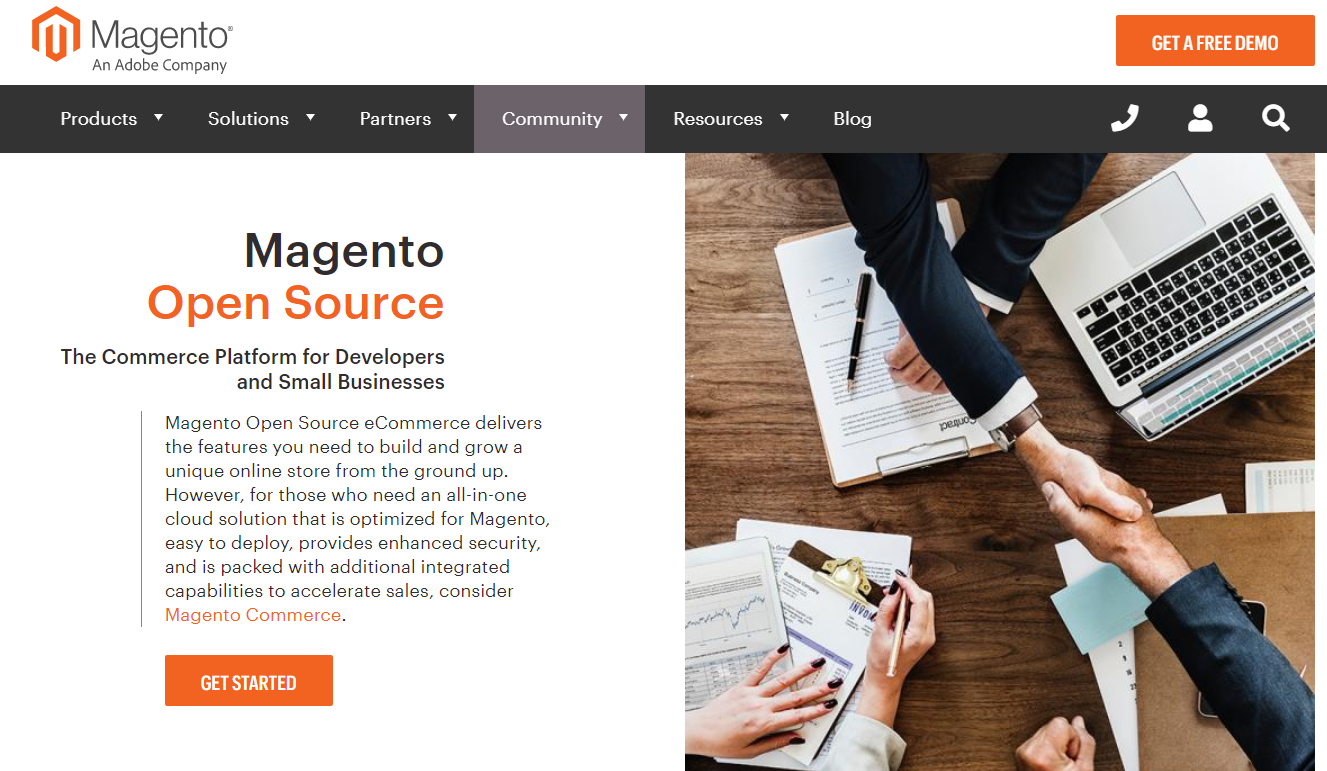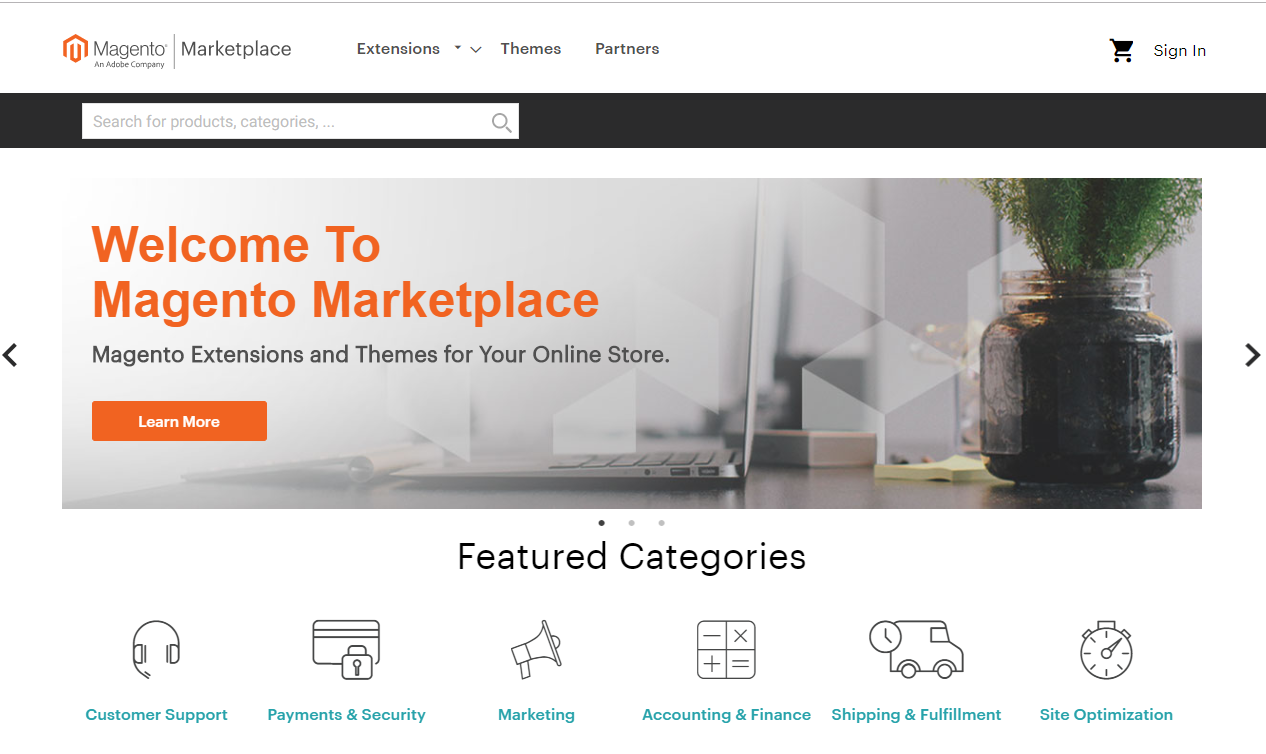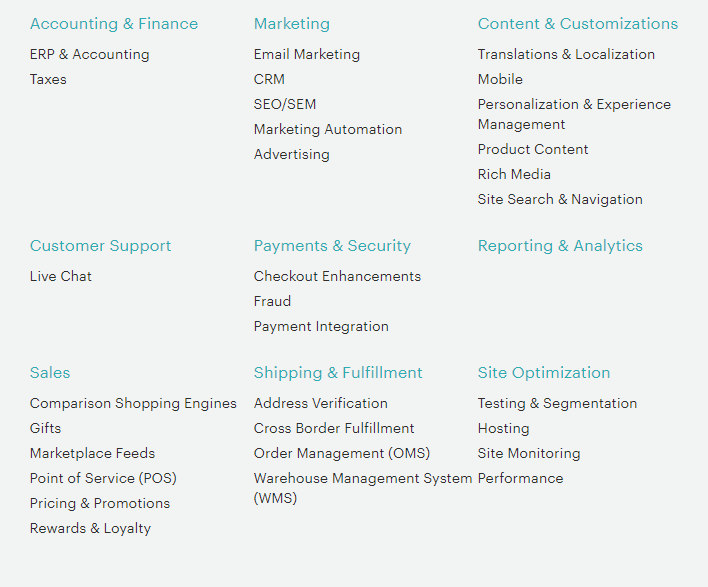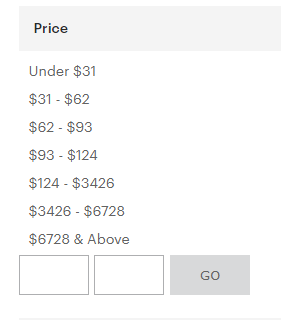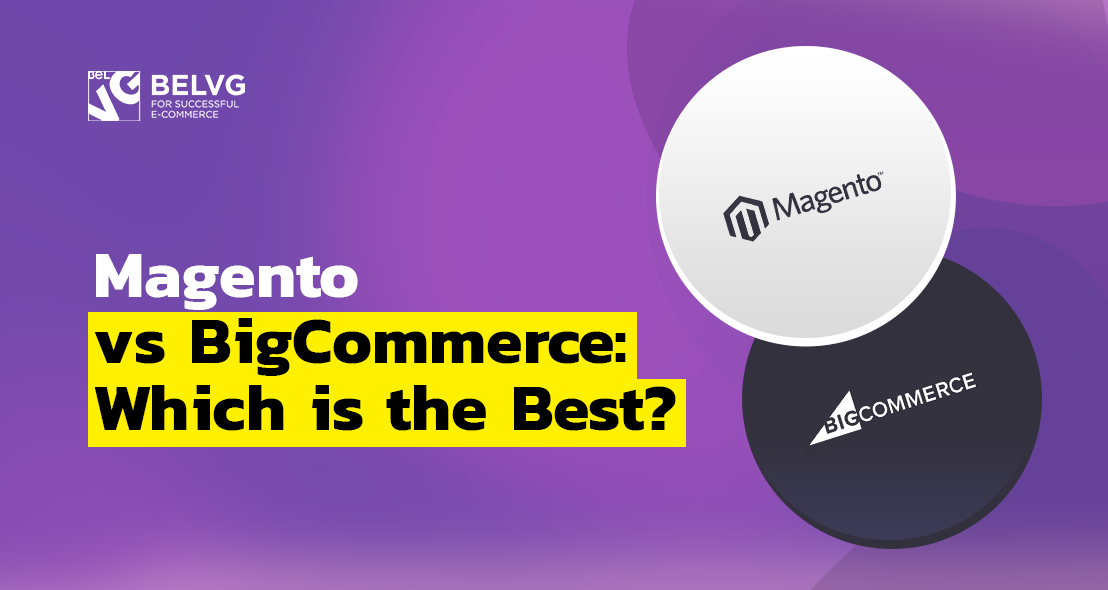
Discover a comprehensive and multi-faceted comparison of Magento and BigCommerce – two leading solutions for building ecommerce enterprises.
Magento and BigCommerce are the two largest ecommerce platforms in the global market of online retail solutions. As much as they are popular around the world, they differ from each other from the solution type and key capabilities to pricing provisions. Do you want to know which one is the best for your business? Then read on.
By the end of this comparison, you will know the key distinguishing features of Magento and BigCommerce and make up your mind about which one represents the best ecommerce solutions for your business.
Table of contents:
Platforms overview
Platform types comparison
Magento versions vs BigCommerce plans
Key ecommerce capabilities
Payment gateways
Customization capabilities
Short comparative table
Magento vs BigCommerce: final thoughts
What is Magento?
Magento is an open source CMS and platform for online retail. It was developed in 2008 by the US company Varien (recently renamed Magento to match their product name) with an aim to provide up-to-date and flawless online retail experience to large and small business owners. Currently, around 25% of businesses around the globe run their online retail with Magento platform; among them are such world-known brands as HP Inc, Canon, Nike, Monin, Ahmad Tea and others.
Magento offers two main products – Magento Open Source and Magento Commerce; the first one is free and has a solid stack of basic ecommerce features, while the second is a paid one, is aimed at the established web stores and comes with advanced ecommerce capabilities. Most certainly, Magento popularity roots in this ability to cater for online businesses of every scale as well as its impressive customization potential.
What is BigCommerce?
BigCommerce is a SaaS-based ecommerce platform for selling goods and services online. BigCommerce was released in 2009 by a similarly named company with headquarters in Texas, US. Over the years, it won popularity with merchants from 120+ countries and is currently considered one of the top-notch online retail solutions.
BigCommerce is a cloud-hosted platform that comes in four diverse pricing plans – BigCommerce Standard, Plus, Pro and Enterprise, each with its functional scope and in its price tier. This allows BigCommerce to provide corresponding ecommerce platforms for small, middle-level and large online enterprises, facilitate businesses development of the start-ups and smoothly scale the growing online businesses. BigCommerce client list includes such global enterprises and famous brands as Gibson Guitars, Kodak, Toyota and Travelpro.
Magento Open Source vs BigCommerce SaaS Platform
The fundamental difference between Magento and BigCommerce roots in their delivery models. While Magento is an open source ecommerce platform, BigCommerce is a Software as a Service solution. Read on to discover what do both models stand for and which advantages can each architecture bring to a business owner.
Magento Open Source
Being an open source software means that Magento programme code is not hidden; instead, the company made the code available to third-party developers so that it could be studied, modified and distributed for individual use. The benefit of open source platform like Magento is that it grants the developers and web-designers working with it unlimited freedom to enhance and customize their webstore, both programmatically or with the pre-made Magento extensions.
Open source code makes Magento an attractive option for businesses that employ an in-house development team. This way, you leverage a complete control over your online store individual configurations, as well as its design and functionality improvement. However, if your on-staff development team is not yet qualified to perform certain tasks or you do not plan to hire a team at all, you can always turn to a reliable Magento development agency for assistance.
BigCommerce Software-as-a-Service
BigCommerce is a SaaS solution, which means that a store owner pays to merely utilize the platform over a certain period of time, but can never come into possession of it. In addition to the platform usage, the monthly fee also includes hosting setup, store maintenance, software upgrades, security guarantees and support provisions, carried out by the BigCommerce company. This is an undeniable advantage for the non-tech-savvy businesses who do not have an on-staff team of developers.
At the same time, a SaaS model is times less customizable than the open source one. Since thousands of stores are simultaneously run with BigCommerce, the matters of security and meeting SLA are of the higher priority than enabling store owners with great configuration flexibility. As a result, there is a certain extent to the programmatical modifications and integrations that can be introduced.
Magento platforms vs BigCommerce pricing plans
Both Magento and BigCommerce offer diversified functionalities in the form of separate platforms or plans. Now we will drill down into the features Magento and BigCommerce plans provide and how much each will cost you.
Magento platforms
Magento had a long history of versions; after the rebranding in 2017 some versions of them were renamed, and some – simply discontinued. At the moment, Magento offers two distinct platform versions – Magento Open Source and Magento Commerce.
Magento Open Source
Open Source is a free self-hosted Magento version, available for download at the official resources. The out-of-the-box features it provides empower store owners to easily create unique and engaging ecommerce experiences. Moreover, its open source architecture enables with unparalleled freedom of individual customization as well as native and third-party integrations.
Technical:
- Modern tech stack
- Auto code merge
- MySQL database server
- Regular platform updates
- Integration with payment gateways
Product management:
- Six product types
- Unlimited amount of product attributes
- Auto image resize and watermarking
- Advanced price rules
- Ability to upload images or text to create customized products (i.e. individual print on a T-shirt)
Checkout & Payment:
- One-page checkout
- Guest checkout
- Saved shopping cart
- In-built PayPal integration
- Default tax and shipping estimates in the shopping cart
Marketing & promotion:
- Up-selling and cross-selling
- Coupons and gift cards generation
- SEO-friendly URLs
- Landing pages for categories
- Google Site Map
As you can see, the features mentioned above are more than enough for setting up an online store from the ground up. Yet, Open Source capabilities and customization scope may not be up to scratch for the established enterprises or middle and large stores. For them, Magento offers the Commerce version.
Magento Commerce
Commerce is Magento company brainchild with a long history of development: announced back in 2010 and due to be released in 2011, it became available to merchants only in 2015. Magento Commerce is a paid version, with the average licence fees amounting to $22.000 for one year. The Commerce version is diversified according to the business size and offers separate pricing plans for small businesses – a Magento Commerce Starter, and both middle- and large enterprises – a Magento Commerce Pro.
All in all, Magento Commerce has substantially more robust functionality than the free version; apart from this, Commerce version owners can rely on Magento native support and maintenance.
Below is the list of the most prominent Magento Commerce features that are absent from the Open Source version.
Key features:
- Cloud hosting option
- Diagnostic tools
- PA-DSS Certification
- B2B functionality
- Signifyd Guaranteed Fraud Protection
- Page Builder
- Visual merchandising
- Elasticsearch
- PWA Studio
- Business intelligence
- A wide selection of third-party integrations
- Abandoned cart notifications via email
- Content staging
- Instant Purchase
All in all, Magento Commerce has a more professional feature stack that allows to create a modern online store that will be in step with the times and the most recent ecommerce technologies.
BigCommerce plans
Most SaaS platforms leverage a certain sales percentage from their clients as part of the service agreement; BigCommerce, in its turn, does not impose any transaction fees on their users. Instead, BigCommerce limits a business to a certain payment plan based on its yearly sales volume.
The four BigCommerce pricing plans have the following sales volume limits:
- Bigcommerce Standard: $50,000
- Bigcommerce Plus: $150,000
- Bigcommerce Pro: $400,000
- Bigcommerce Enterprise: negotiable
As soon as the volume surpasses the one appointed to your pricing plan, you receive a notification from the BigCommerce, encouraging to upgrade to the next level.
BigCommerce Standard
This standard plan is the cheapest of BigCommerce offerings, with a price of $29.95 per month and a sales limit of $50.000, but a pleasantly comprehensive one. Despite being positioned as the entry-level plan, BigCommerce Standard provides for all the core aspects of a functioning online store.
Key features:
- Single-page checkout
- Responsive website
- Unlimited number of products
- Unlimited file storage
- Image auto-optimization
- Product ratings and reviews
- Unrestricted bandwidth
- Built-in ratings and reviews for products
- Store performance reporting
- Coupons, discounts and gift cards
As you can see, BigCommerce Standard goes with pretty much all the ingredients that a small online store may ever need. There is only one signature BigCommerce feature missing from this plan – an abandoned cart saver. This is a piece of script that automatically sends reminders about the uncompleted purchase to the corresponding customer. Apart from this feature, with BigCommerce Standard plan you will be all set to start your ecommerce.
BigCommerce Plus
We proceed to the next, most popular BigCommerce pricing plan – BigCommerce Plus. This one costs $79.95 per month and has a sales limit of $150.000. In addition to the solid stack of online retail features in BigCommerce Standard, Plus has a variety of marketing tools, aimed at increasing conversion.
Key features:
- Abandoned cart saver
- Customer segmentation features (great for creating loyalty programs)
- Persistent cart – synchronises the shopping cart contents among every user’s device
- Stored credit cards for regular customers
Bigcommerce Pro
This plan has a comparatively higher sales volume limit of $400.000 and imposes a monthly fee of $249.95. However, the $150 increase in payment per month does not open up an impressive number of new features.
Key features:
- Custom facets (product filtering)
- Price Lists
- Unlimited API Calls
- API Support
- Google Customer Review program
Bigcommerce Enterprise
This pricing plan is aimed at large ecommerce stores with a high volume of sales – one million and more. The annual sales limits for this plan are negotiated individually.
Key features:
- Consulting and account management services
- Priority support
- Sophisticated product filtering
- Unlimited API calls
Key Ecommmerce Capabilities
Above we outlined Magento and BigCommerce pricing plans and enumerated their core features. Below, you will find the lists of both platforms’ ecommerce features that can be rightfully considered their competitive advantage.
Magento features for online retail
- Six product types, including digital, downloadable, gift cards and bundle products
- Customer groups
- Product bundles
- Flexible coupons and pricing rules
- Persistent shopping cart
- Roles and users permission system
- Multi-store capability
- Multi-currency and multi-language
- Content management system
- CAPTCHA functionality
- Multi-tier pricing upsell
- Google Analytics integration
- Tax rules creation and management
- Mobile-responsive
BigCommerce features for online retail
- Built-in product review
- Abandoned cart saver feature
- Up to 250 product options
- Product page file uploads
- Point of sale functionality
- Accelerated Mobile Pages (AMP) format
- Multichannel selling
Default integration with Facebook and marketing services like e-mail marketing services: Constant Contact, iContact, Mailchimp and Interspire - Absence of transaction fees
- Auto-generated XML sitemap
- Editable Robots.txt file
Payment gateways
In the brick-and-mortar store, there is a cash register to fulfil the purchase-payment operation. In the online shop, the role of a cash register is performed by a payment gateway, which is a service that processes credit card payments.
It will not be an exaggeration to say that payment gateways are a source of headaches for every store owners. There are two reasons why payment gateways are so troublesome: firstly, they are the primary targets for hackers and scammers, and secondly, they are, or rather the lack of payment options, recognized among the top reasons for shopping cart abandonment.
Therefore, every store owner must balance the payment options and make sure to offer a satisfactory selection of secure gateways.
Magento payment gateways
By default, Magento offers a comparatively small number of payment gateways. However, there is a wide choice of official gateways integrations at the official Magento marketplace; select the one you find necessary for your store’s operation and smoothly integrate it into your ecommerce experience.
List of in-built Magento payment gateways:
- Authorize.Net
- AmazonPay
- Barclaycard CPI
- Barclaycard MPI
- Klarna
- PayPal Standard
- PayPal Express
- PayPal Pro
- PayPal Payflow Link
- PayPal Payflow Pro
- Sage Pay Form
- Sage Pay Direct
List of available Magento payment gateway integrations:
- HSBC API
- HSBC CPI
- Skrill
- Stripe
- WorldPay
- Amazon FPS
- Checkout by Amazon (in the form of a free Magento extension)
- Google Checkout
Apart from all the in-built and supported payment gateways integrations, in the first quarter of 2019 Magento released Magento Payments – the native payment gateway tool. It promises improved conversions, automatically synchronized cash flow and enforced fraud protection.
BigCommerce payment gateways
BigCommerce provides 65+ in-built payment gateways that support 250+ payment methods; there are also digital and mobile wallets integrations among them. Among those 65+ gateways, you can find ones that support 3D secure, that allow to capture funds through BigCommerce, ones with integrated refunds and so on.
List of available BigCommerce payment gateway integrations:
- 2Checkout
- Adyen
- Afterpay
- Amazon Pay
- Authorize.net
- Beanstream
- BlueSnap Payments
- Chase Merchant Services
- Chase Integrated Payments
- Clover Payments
- Cybersource Direct
- Elavon – Converge
- eWAY Rapid
- First Data Payeezy Gateway
- Global Payments
- Heartland Payment Systems
- Klarna Payments
- MIGS
- NAB
- NMI
- Paymetric
- Payment Express Post
- PayPal powered by Braintree
- PayPal Payflow Pro
- PayPal Express Checkout
- PayPal Credit
- PayPal Payments Pro
- PayStation
- Pin Payments
- QuickBooks Payments
- Sage Pay/Protx VSP Direct
- Sage Pay/Protx VSP Form
- SecureNet
- SecurePay
- ShopKeep Payments
- Skrill
- Square
- Stripe
- USA ePay
- Worldpay Ecomm
- Worldpay Core
- WorldPay
Customization capabilities
Although both Magento and BigCommerce offer a comprehensive stack of capabilities, it is still impossible to meet the evolving needs of every ecommerce owner. That is why the customization potential and flexibility is critical for an ecommerce platform feature.
Magento extensions & themes
Magento Marketplace, https://marketplace.magento.com/, has a comparatively larger choice of third-party tools that can beef up a Magento store’s functionality or alter its design and user experience.
There are around 5000 Magento extensions available at the marketplace, both free and paid. They come in nine large categories that are divided further into smaller subcategories.
Certain Magento extensions costs can go up to $5000 and higher, but those are rare cases. The average price for Magento plugins ranges from $100 to $199.
The choice of themes, as contrasted with extensions, is very modest. There are only 14 Magento themes in the marketplace, so if you are looking for a wider selection of designs, I would advise you to research at third-party marketplaces like TemplateMosters or Store BelVG.
BigCommerce templates & apps
The official BigCommerce marketplace, https://www.bigcommerce.com/apps/, offers a modest, but reasonably solid selection of templates and apps.
All the BigCommerce apps – there are around 650 of them – are allocated into 15 categories.
One can sort and filter each category according to a subcategory, price, reviews and partner tier.
As for themes, there are 130 paid and 10 free BigCommerce templates at the official marketplace. The price of the paid ranges from $145 to $235.
The BigCommerce designs come in 12 thematic categories.
Help and support
Breakdowns and outages are never predictable, but can cost thousands of dollars to a business owner. Therefore, professional and timely support is a valuable ecommerce platform feature.
Magento Support
Support is provisioned to Magento Commerce version only; it is not continuous, but instead functions on the on-demand, or application basis.
BigCommerce Support
BigCommerce claims to provide 24/7 phone, chat and email support for every pricing plan. One can always research the issue they are experiencing in the BigCommerce Help Center knowledge base and find the instructions on how to fix your problem.
Magento vs BigCommerce: Comparative Table
| Magento | BigCommerce | |
| Type of solution | Ecommerce platform | SaaS platform |
| Hosting | Self-hosted | Cloud-based |
| Programming language and frameworks | PHP
HTML5 CSS3 |
Stencil Framework
HTML Regular CSS |
| Pricing plans | Magento Open Source – free
Magento Community – price by quote |
Bigcommerce Standard: $50,000
Bigcommerce Plus: $150,000 Bigcommerce Pro: $400,000 Bigcommerce Enterprise: negotiable |
| Help and support | 24/7 by phone, mail and chat | On-demand, available for Magento Commerce |
| Extensions and designs | Around 5000 extensions and 14 themes at the official marketplace | 650 apps and 140 themes at the official marketplace |
| Key Ecommmerce Capabilities |
|
|
| Payment gateways | 12 in-built and 8 supported integrations | 65+ supported integrations |
| Custom development costs | $35 – $60 per hour; rate depends on the choice of developer and difficulty of work | $15 – $150 per hour; rate depends on the choice of developer and difficulty of work |
Magento vs BigCommerce – which should you choose?
In conclusion, it will be wise to say that both solutions are top-notch ecommerce technologies with sophisticated online retail functionalities. It is impossible to pick an ultimate winner, so the choice of which is the best should root in the individual store owner requirements, their goals and perspectives.
#1: If you like to take matters of online business in your own hands and want unlimited control and freedom over your webstore, then the open source Magento is your best choice. However, in case you are not willing to go deep into technicalities and want your ecommerce to be maintained for your without your particular involvement, then it is BigCommerce you should select.
#2: The choice between Magento and BigCommerce depends on how established your business is. If you are making your first steps in ecommerce, mistakes are inevitable; Magento free version will allow you not to pay too much for your rookie mistakes. On the other hand, if you have a stable business that is expected to grow steadily, then it will be wiser to start your ecommerce journey with BigCommerce and its smooth price tiering.
#3: Both Magento and BigCommerce have unique ecommerce features that may influence your choice between them. In Magento, this unique tool is a page builder, persistent cart and ability to create and manage multiple stores from one admin panel. In BigCommerce, it is abandoned cart saver, Accelerated Mobile Pages (AMP) and native integration with advanced marketing tools.
#4: Magento and BigCommerce cost differently, so the choice also depends on how much you are ready to pay for your future store. BigCommerce does not have a free option, and its cheapest pricing plan will cost you $29.95 per month. Magento has a free option, but it lacks a certain amount of additional ecommerce features that might prove indispensable to a store owner. The custom development rates for both platforms also differ, but not that significantly to consider it a problem. BigCommerce development rate is higher, but as a SaaS platform, it commonly requires less programmatical alterations. Magento development rate is lower, but the amount of the required work is naturally higher.
All in all, every aspect should be taken into account when you make such a groundbreaking decision. Hopefully, this detailed comparison will answer all the questions you ever had about Magento and BigCommerce and help you make up your mind on which is the best for your particular business.
Need reliable custom Magento development providers? Turn to BelVG.
Magento Development Services
Take your online store to the next level with BelVG Magento development
Visit the page


